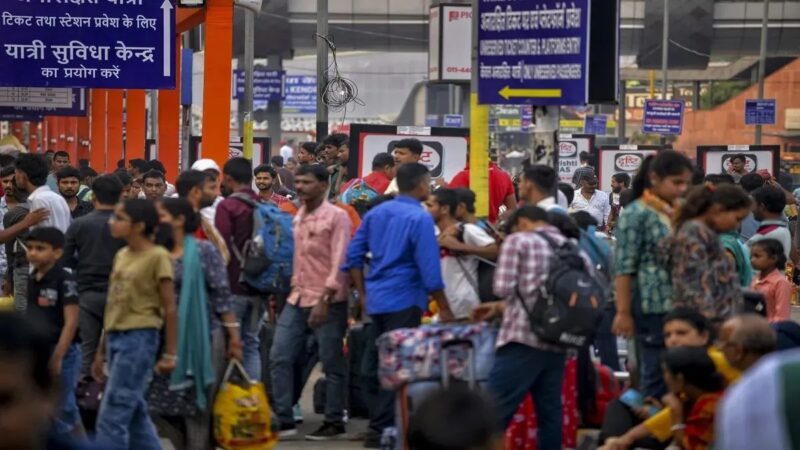
As Bihar gears up for a crucial phase in the upcoming assembly elections, the movement of people across state borders has emerged as a pivotal aspect of the political landscape. Thousands of migrant workers, who have been living in neighboring states such as Uttar Pradesh, Jharkhand, West Bengal, Haryana, and Delhi, are now making their way back to Bihar. However, their return is not for festivals or family gatherings, but to exercise their right to vote in the upcoming election. What makes this mass migration particularly notable is the fact that political parties are covering the expenses for travel, meals, and voter coordination, ensuring that the workers can return home to participate in the electoral process.
Political Parties Take Charge of Migrant Worker Movement
In recent days, Bihar’s major railway stations have become key hubs of political activity, with party workers actively involved in organizing the movement of migrant workers. The cost of travel, which would typically be borne by the passengers, is now being funded by political parties, who are covering train fares, offering free food, and even registering voters. These party-operated counters at stations are not only providing transportation tickets but also collecting voter details, making sure that workers have everything they need to cast their ballots when they return home. As trains depart for Bihar, platforms are alive with party slogans, making the scene not only a logistical operation but also a politically charged event.
A Surge in Mobilization in Border Districts
The increase in the number of passengers traveling to Bihar has been most evident in the border districts. Key railway stations such as Banaras, Ballia, Ghazipur, Chandauli, Mirzapur, Prayagraj, Dhanbad, Ranchi, Giridih, and Jamshedpur have witnessed a surge in crowds since the start of the week. According to station officials, the flow of passengers resembles the Chhath festival rush, indicating the sheer volume of people heading towards Bihar.
Around these stations, temporary party camps have sprung up. Here, volunteers are busy registering names, Aadhaar numbers, mobile contacts, and constituency details. These efforts are all part of the coordinated mobilization, ensuring that the workers have the necessary information to reach the correct departure points and make their way home to vote. Volunteers are stationed around the clock to guide travelers and ensure that their journey runs smoothly.
Free Travel, Food, and Political Messaging
The arrangements go beyond just transportation. Passengers who arrive at Patna station have shared their experiences of receiving food, water, snacks, and tea, which are provided by party workers. In addition to regular train services, special trains have been arranged to ensure that migrant workers can make it home within tight schedules, in time to vote.
While the logistical support is substantial, it is the political messaging that stands out. The fact that migrant workers, who are often absent during elections due to distance and other factors, are being brought back to their home state to vote speaks to the significance of these elections. Many travelers openly admitted that they returned specifically to support the party of their choice. For them, the free travel and meals are just part of a larger effort to engage them in the democratic process.
In addition to transportation and food, political parties have also organized volunteers to provide voters with booth-level information, ensuring that once the migrant workers reach their constituencies, they know exactly where to cast their votes. This level of coordination reflects the urgency with which these political parties are attempting to ensure a high voter turnout.
Railway Administration’s Silence and Political Debate
Despite the large-scale efforts to facilitate voter mobilization, the railway administration has maintained complete silence on the matter. No state government has officially announced any free travel initiative, raising questions about how such a large-scale movement is being carried out. The issue has led to political friction, with opposition parties accusing the ruling alliance of violating the Model Code of Conduct. They argue that such widespread arrangements amount to undue influence on voters, questioning the legitimacy of such activities during the election period.
On the other hand, the ruling alliance defends these actions, claiming that helping citizens return home to vote is a matter of promoting democratic participation, rather than a violation of electoral rules. This difference in viewpoints has fueled political debate, with both sides using the situation to highlight their contrasting approaches to voter engagement.
Bihar Politics: A Contest of Resources
Political observers suggest that the ongoing situation in Bihar reflects a deeper trend in the state’s politics. As one analyst puts it, elections in Bihar are no longer just a contest of ideas; they have become a contest of resources. The strategic mobilization of people, the provision of free travel, food, and accommodation, and the coordination of voter details have turned into powerful tools that shape the political narrative. These resources are being used as key instruments in the election battle, further intensifying the already fierce competition between political parties.
A Festival of Democracy or a Political Strategy?
Bihar has long treated its elections as a public celebration, often compared to a festival, with vibrant colors, large crowds, and spirited competition. However, the current wave of free travel and meal distributions, along with the logistical coordination to get migrant workers home to vote, raises new questions about the nature of electoral participation in the state.
While many returning passengers maintain that their motivation is simple—that they are coming home to take part in the democratic process—the situation hints at a broader political transformation. The spectacle at the stations, with its mixture of slogans, food packets, and party volunteers, suggests that the journey to vote has become as politicized as the vote itself. In a state like Bihar, where elections have always been a high-stakes event, these new methods of voter engagement are shaping the future of political campaigns.
As the election nears, it is clear that the dynamics of Bihar’s electoral process are evolving. The mass return of migrant workers, facilitated by political parties, will undoubtedly play a significant role in determining the outcome of the 2025 Bihar assembly elections. The political implications of this new model of voter mobilization remain to be fully understood, but one thing is certain: Bihar’s elections will continue to be a spectacle, drawing national attention for their unique blend of democracy and political strategy.
Share this:
- Click to share on WhatsApp (Opens in new window) WhatsApp
- Click to share on Facebook (Opens in new window) Facebook
- Click to share on Threads (Opens in new window) Threads
- Click to share on Reddit (Opens in new window) Reddit
- Click to share on Telegram (Opens in new window) Telegram
- Click to share on X (Opens in new window) X
- Click to share on LinkedIn (Opens in new window) LinkedIn


